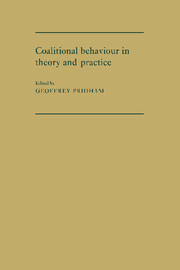Book contents
- Frontmatter
- Contents
- List of illustrations
- List of tables
- Notes on the contributors
- Preface
- 1 An inductive theoretical framework for coalitional behaviour: political parties in multi-dimensional perspective in Western Europe
- 2 Between theoretical elegance and political reality: deductive models and cabinet coalitions in Europe
- 3 Changing coalitional preferences among West German parties
- 4 The FDP and coalitional behaviour in the Federal Republic of Germany: multi-dimensional perspectives on the role of a pivotal party
- 5 Cabinet stability in the French Fourth Republic: the Ramadier coalition government of 1947
- 6 Coalition formation and maintenance in Belgium: a case-study of elite behaviour and changing cleavage structure, 1965–1981
- 7 The Dutch Christian Democratic party and coalitional behaviour in the Netherlands: a pivotal party in the face of depillarisation
- 8 Coalition or Fianna Fail? The politics of inter-party government in Ireland
- 9 Italy's party democracy and coalitional behaviour: a case-study in multi-dimensionality
- 10 Party coalitions in the first democratic period in Spain, 1977–1982
- 11 Coalitional theory and practice in Scandinavia
- 12 Multi-dimensional approaches to the study of local coalitions: some cross-national comparisons
- 13 Research notes
- Index
2 - Between theoretical elegance and political reality: deductive models and cabinet coalitions in Europe
Published online by Cambridge University Press: 05 November 2011
- Frontmatter
- Contents
- List of illustrations
- List of tables
- Notes on the contributors
- Preface
- 1 An inductive theoretical framework for coalitional behaviour: political parties in multi-dimensional perspective in Western Europe
- 2 Between theoretical elegance and political reality: deductive models and cabinet coalitions in Europe
- 3 Changing coalitional preferences among West German parties
- 4 The FDP and coalitional behaviour in the Federal Republic of Germany: multi-dimensional perspectives on the role of a pivotal party
- 5 Cabinet stability in the French Fourth Republic: the Ramadier coalition government of 1947
- 6 Coalition formation and maintenance in Belgium: a case-study of elite behaviour and changing cleavage structure, 1965–1981
- 7 The Dutch Christian Democratic party and coalitional behaviour in the Netherlands: a pivotal party in the face of depillarisation
- 8 Coalition or Fianna Fail? The politics of inter-party government in Ireland
- 9 Italy's party democracy and coalitional behaviour: a case-study in multi-dimensionality
- 10 Party coalitions in the first democratic period in Spain, 1977–1982
- 11 Coalitional theory and practice in Scandinavia
- 12 Multi-dimensional approaches to the study of local coalitions: some cross-national comparisons
- 13 Research notes
- Index
Summary
Theories of government coalition formation tend to have one of two academic pedigrees. On the one hand, there are theorists who set out to understand the workings of coalition government. Usually, their theories are inductive in methodological style, being based on generalisations from the real world of politics to the more abstract world of political theory.
On the other hand, there are formal theorists, usually with a background in rational-choice theory, who tend to regard actual government coalitions as data on which to test essentially deductive analyses. These are based upon a priori assumptions, of varying plausibility, about the motivations of the actors. Many of the deductive theories were originally tested using the time-honoured technique of paying graduate students money to play a rather formalised and artificial game. The view of ‘coalitions’ that evolves through this process, not surprisingly, is one of coalitions of individuals, each attempting to capture some clearly specified prize.
It would be remarkable if such different: pedigrees did not result in quite different offspring. An appreciation of this confrontation between inductive and deductive styles of reasoning is essential to an understanding of the purpose of this book. Deductive theories of coalition formation have had a good run for their money, so far. They have achieved levels of predictive success much higher than those usually encountered in the social sciences.
- Type
- Chapter
- Information
- Coalitional Behaviour in Theory and PracticeAn Inductive Model for Western Europe, pp. 32 - 44Publisher: Cambridge University PressPrint publication year: 1986
- 8
- Cited by

